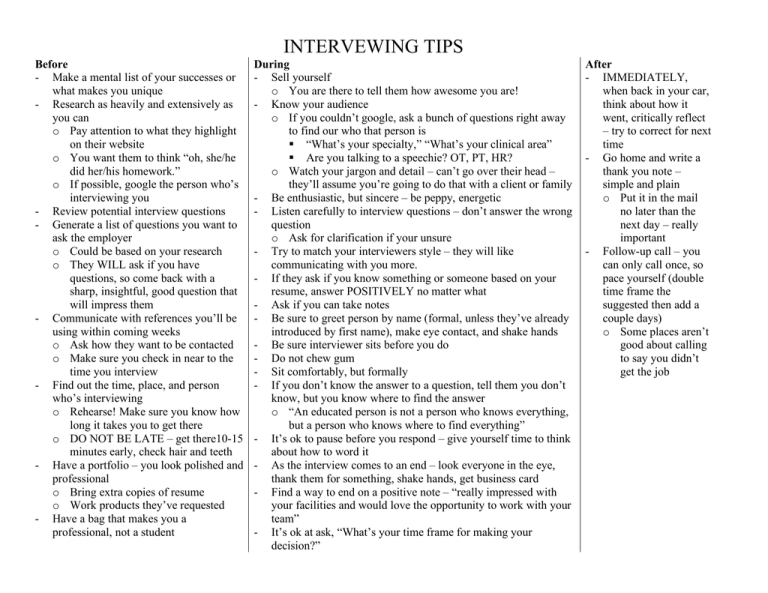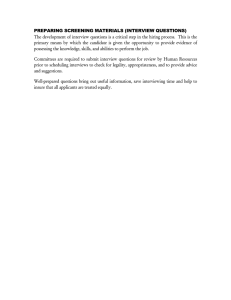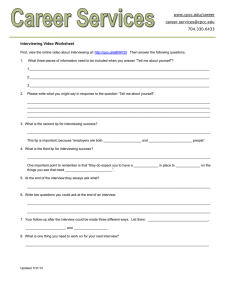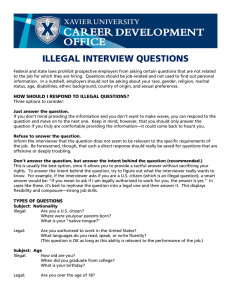INTERVEWING TIPS
advertisement

INTERVEWING TIPS Before - Make a mental list of your successes or what makes you unique - Research as heavily and extensively as you can o Pay attention to what they highlight on their website o You want them to think “oh, she/he did her/his homework.” o If possible, google the person who’s interviewing you - Review potential interview questions - Generate a list of questions you want to ask the employer o Could be based on your research o They WILL ask if you have questions, so come back with a sharp, insightful, good question that will impress them - Communicate with references you’ll be using within coming weeks o Ask how they want to be contacted o Make sure you check in near to the time you interview - Find out the time, place, and person who’s interviewing o Rehearse! Make sure you know how long it takes you to get there o DO NOT BE LATE – get there10-15 minutes early, check hair and teeth - Have a portfolio – you look polished and professional o Bring extra copies of resume o Work products they’ve requested - Have a bag that makes you a professional, not a student During - Sell yourself o You are there to tell them how awesome you are! - Know your audience o If you couldn’t google, ask a bunch of questions right away to find our who that person is “What’s your specialty,” “What’s your clinical area” Are you talking to a speechie? OT, PT, HR? o Watch your jargon and detail – can’t go over their head – they’ll assume you’re going to do that with a client or family - Be enthusiastic, but sincere – be peppy, energetic - Listen carefully to interview questions – don’t answer the wrong question o Ask for clarification if your unsure - Try to match your interviewers style – they will like communicating with you more. - If they ask if you know something or someone based on your resume, answer POSITIVELY no matter what - Ask if you can take notes - Be sure to greet person by name (formal, unless they’ve already introduced by first name), make eye contact, and shake hands - Be sure interviewer sits before you do - Do not chew gum - Sit comfortably, but formally - If you don’t know the answer to a question, tell them you don’t know, but you know where to find the answer o “An educated person is not a person who knows everything, but a person who knows where to find everything” - It’s ok to pause before you respond – give yourself time to think about how to word it - As the interview comes to an end – look everyone in the eye, thank them for something, shake hands, get business card - Find a way to end on a positive note – “really impressed with your facilities and would love the opportunity to work with your team” - It’s ok at ask, “What’s your time frame for making your decision?” After - IMMEDIATELY, when back in your car, think about how it went, critically reflect – try to correct for next time - Go home and write a thank you note – simple and plain o Put it in the mail no later than the next day – really important - Follow-up call – you can only call once, so pace yourself (double time frame the suggested then add a couple days) o Some places aren’t good about calling to say you didn’t get the job INTERVEWING TIPS, Cont. Miscellaneous Points - Consider the Employer Perspective o Looking for someone who will fit in the team o Want to know they can afford you - You are an investment, so the interview is designed to make sure they can, and will want to, keep you Legal and Illegal questions - Before offered a job: o Legal: pertain to things related to ability to actually do job Hold state licensure? Ever worked with 3 year olds? If required to drive: do you hold a driver’s license Willing or able to work overtime/weekends o Illegal: age or date of birth, graduation year, etc, religion, marital status, sexual orientation, national origin, spouse’s name and/or employment, worker’s comp, physical impairments or disabilities, time lost due to illness or family commitments, health history - After offered a job: o Now legal: drug test, copy of birth certificate or passport, copy of SSC Need to verify/prove you are hirable person - How to answer? o Professor said that was an illegal question… o Humor – i.e. husband count as kid? Example questions - Assume you’ll get clinical questions about working with the population you’re interviewing for Give me an example of a conflict you have had in a work situation and how you resolved it What would your friends say about you? How would people you’ve worked with describe you? What do people like most/least about you? If you had a budget of ____ to spend on clinical materials, how would you spend it? Thinking about your role in this facility, what areas would you need to strengthen the most? Given a child in this condition, what would your differential diagnosis be and how would you evaluate them?








